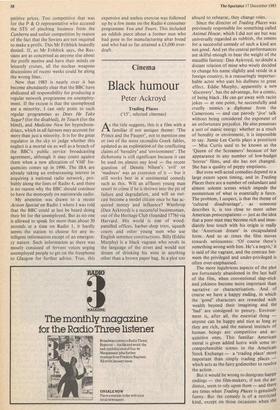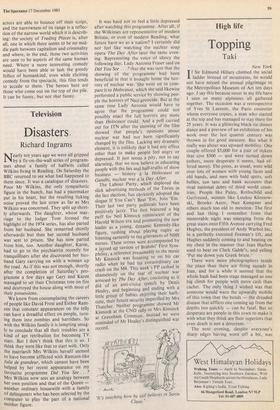Cinema
Black humour
Peter Ackroyd
Trading Places (` 15', selected cinemas)
Athe title suggests, this is a film with a familiar if not antique theme: `The Prince and the Pauper', not to mention one or two of the more recondite Greek fables, updated as an exploration of the conflicting claims of 'heredity' and 'environment'. The dichotomy is still significant because it can be used on almost any level — the recent question of Dennis Nilsen's 'evil' or 'madness' was an extension of it — but it still works best in a sentimental comedy such as this. Will an affluent young man resort to crime if he is thrown into the pit of failure and degradation, and will an out- cast become a model citizen once he has ac- quired money and influence? Winthrop (Dan Aykroyd) is a successful businessman, out of the Heritage Club (founded 1776) via Harvard. His world is one of wood- panelled offices, barber-shop trios, squash courts and other young men who use English sentence constructions. Billy (Eddie Murphy) is a black vagrant who revels in the language of the street and would not dream of drinking his wine in anything other than a brown paper bag. In a plot too
absurd to rehearse, they change roles.
Since the director of Trading Places was previously responsible for something called Animal House, which I did not see but was universally regarded as rubbish, the omens for a successful comedy of such a kind are not good. And yet the central performances are skilful enough to bear the weight of the maudlin fantasy. Dan Aykroyd, no doubt a distant relation of mine who wisely decided to change his name slightly and reside in a foreign country, is a reassuringly impertur- bable actor who uses his dullness to great effect. Eddie Murphy, apparently a new 'discovery', has the advantage, for a comic, of being black. He can get away with racist jokes — at one point, he successfully and cruelly mimics a diplomat from the Cameroons — and can parody 'jive' talk without being considered the exponent of an unfortunate prejudice. He also possesses a sort of manic energy: whether as a result of heredity or enviroment, it is impossible to say. Jamie Lee Curtis plays a prostitute — Miss Curtis used to be known as the 'Queen of the Screamers' because of her appearance in any number of low-budget 'horror' films, and she has not changed. She has a quality of peppy emptiness.
But even well-acted comedies depend to a large extent upon timing, and in Trading Places there are a number of redundant and almost solemn scenes which impede the momentum of what is essentially a farce. The problem, I suspect, is that the theme of `cultural disadvantage', as someone describes it, is too close to more sober American preoccupations — just as the idea that a poor man may become rich and imm- diately lose touch with his origin is really the 'American dream' in encapsulated form. And so at times the film moves towards seriousness: 'Of course there's something wrong with him. He's a negro,' it is said of the vagrant, and the contrast bet- ween the privileged and under-privileged is often over-emphasised.
The more lugubrious aspects of the plot are fortunately abandoned in the last half of the film, when conventional slap-stick and jokiness become more important than narrative or characterisation. And of course we have a happy ending, in which the `good' characters are rewarded with wealth beyond their imagining and the `bad' are consigned to penury. Environ- ment is, after all, the essential thing anyone can be happy and nice as long as they are rich, and the natural instincts of human beings are competitive and ac- quisitive ones. This familiar American moral is given added lustre with some in- comprehensible scenes in the American Stock Exchange — a `trading place' more important than simply trading places — which acts as the fairy godmother to resolve the action.
But it would be wrong to denigrate happy endings — the film-makers, if not the au- dience, seem to rely upon them — and there are times when Trading Places is genuinely funny. But the comedy is of a restricted kind, except on those occasions when the actors are able to bounce off their script, and the narrowness of its range is a reflec- tion of the narrow world which it is describ- ing: the society of Trading Places is, after all, one in which there seems to be no mid- dle path between capitalism and criminality and where, in the end, those two activities are seen to be aspects of the same human need. Where a more interesting comedy would have been able to lash the greedy follies of humankind, even while eliciting comedy from the spectacle, this film tends to accede to them. The heroes here are those who come out on the top of the pile. It can be funny, but not that funny.







































































 Previous page
Previous page